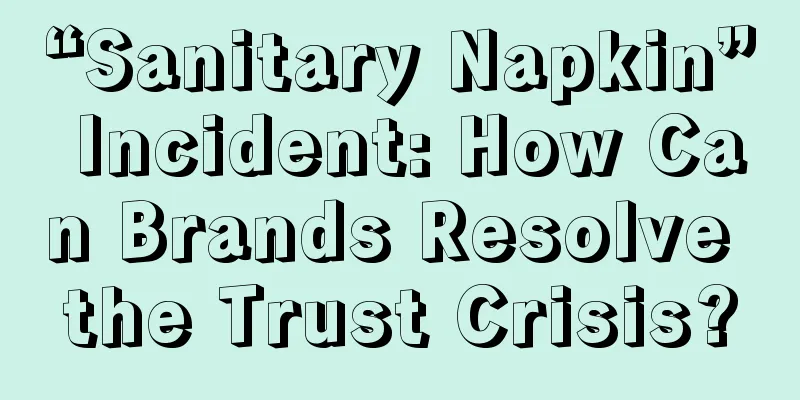“Sanitary Napkin” Incident: How Can Brands Resolve the Trust Crisis?

Sanitary napkins are just a pseudo-outlet of the dilemma facing female consumers. The incident of "cutting corners" on sanitary napkins, which has been on the hot search for more than half a month, is still fermenting. From the menstrual poverty problem of "bulk sanitary napkins", to the cancer risk of "toxic sanitary napkins", to the current "shrinkage" problem, sanitary napkins, which women need, have become a big problem. This incident not only involves the length and material of sanitary napkins, but also the pH value of sanitary napkins. The public's doubts about the safety of sanitary napkins and the backward standards have caused a lot of controversy. A series of problems involved many well-known brands including ABC, Sophie, Kotex, Always, Jieting, and Seventh Generation. As a result, the brands responded in a surprisingly consistent manner: "The product length is strictly in accordance with national standards and specifications of ±4%, which is within a reasonable error range." But public opinion has not subsided. Many women lamented: "Why is it so difficult to buy qualified sanitary napkins now?" The problem behind this is the backward standards of the sanitary napkin industry. Whether this can be improved is what consumers are most concerned about. 1. Sanitary napkin controversyRecently, sanitary napkin-related terms such as "Doctors say using these three types of sanitary napkins can easily lead to illness" have frequently become popular searches. For a time, menstrual poverty and bathroom safety have become the focus of consumers' attention. Some netizens have calculated the cost of sanitary napkins for women throughout their lives: a normal woman has more than 400 menstrual periods in her lifetime, with each menstrual period lasting 4 to 7 days, and uses 2 to 3 packs of sanitary napkins on average. In other words, a woman will buy 1,000 packs of sanitary napkins in her lifetime, spending at least 10,000 yuan; if she chooses some well-known brands, the cost ranges from 10,000 to 50,000 yuan. This kind of personal consumption, which spans a long period of time and is not cheap, has made it difficult for female consumers to find a product on the market that they can use with confidence. Before the sanitary napkin incident, Zhang Jin (pseudonym) was a loyal user of Sophie. "In the past, when there were promotions, I would stock up at least half a year's supply. Now that these sanitary napkin brands have collapsed, I am no longer planning to stock up because I don't know which brand to buy. Zhang Jin is not the only one who doesn't know which sanitary napkin to buy. Many female consumers said that they are afraid to buy sanitary napkins on the market. According to public data, on November 18, the search popularity of the term "doctor sanitary napkin device number" on Taobao increased by 3920% month-on-month. In addition, the search volume of terms such as medical pads and medical panty liners also increased by more than 635% month-on-month. It can be seen that a large number of female consumers are very concerned about how to buy suitable sanitary napkins. Another female consumer said: "I always get acne after using sanitary napkins, and I thought it was my own problem. But after reading the bloggers' reviews, I realized that the sanitary napkins were substandard. But the reason they can be mass-produced is probably because the standards are not met." Indeed, the current standards for sanitary napkins mainly include "GB 15979-2002" and "GB/T 8939-2018". Among them, "GB 15979-2002" is the "Sanitary Standard for Disposable Sanitary Products", which mainly stipulates the hygienic requirements for sanitary napkins. "GB/T 8939-2018" is the "Sanitary Napkin (Pad)" standard, which puts forward specific requirements for the raw materials, production process, product performance, etc. of sanitary napkins. For example, the standard stipulates that the pH value of sanitary napkins should be between 4.0 and 9.0, and the deviation of the full length of sanitary napkins should be "±4%". The main controversial points of this sanitary napkin incident are the pH range and the deviation of length. According to the sanitary napkin brands currently measured publicly, almost all brands are playing "edge ball", only short but not long, and comparing each other. For example, the cloud cotton sanitary napkin of Always is marked as 284mm long, but the actual measured cotton length is 226mm, a difference of 58mm. Such a gap makes consumers feel misled and think that the brand exaggerates the actual effect of the product in its publicity. The company does save money, but consumers will only increase the risk of side leakage and seepage. The pH value range is the same as that of Class C textiles (non-direct skin contact). To elaborate, although sanitary napkins do not belong to textile products and are not classified into A, B, or C, as sanitary napkins are products that come into direct contact with the skin, consumers have doubts about the pH value range specified in the standard being too loose. At the same time, many companies such as Zhongshun Roujie and Besute have claimed that sanitary napkins can meet the pH value standard of Class A products in the national standard for textiles. A relevant person in charge of Zhongshun Jierou said that if the pH value of its sanitary napkins meets the Class A standard according to the textile testing classification, the weak acid of the sanitary napkin can balance the microecology of the private parts, which is better for long-term use. However, the performance of these brands is far less than that of well-known brands such as ABC, Sophie, Kotex, Always, Jieting, and Seventh Generation. As public opinion fermented, the latter became the target of consumers' criticism. 2. Sanitary napkin brands “make money”At the beginning of the sanitary napkin incident, ABC brand publicly issued an apology statement on November 13 for the customer service's remarks that "if you feel you can't accept it, you don't have to buy it", but consumers did not buy it. On November 22, ABC brand founder Deng Jingheng publicly bowed and apologized, promising to strive to become the first company in the industry to achieve "zero negative difference in national standards", and admitted that the company made mistakes in handling the crisis public opinion, which led to continuous hot searches for many days. Sophie pinned a scientific article about the materials used in sanitary napkins on its official Weibo account. However, consumers’ “condemnation” of various brands of sanitary napkins did not stop with the “clarification”. After all, in the eyes of these companies, a reduction of 3-5 mm in the length of a sanitary napkin seems to have little impact on a single consumer. Behind this "error" may be hidden huge economic benefits. If each sanitary napkin is shortened by a few seemingly insignificant millimeters, under the scale effect, the company's costs can be saved a lot and profits can be increased accordingly. Why not do it? From the perspective of cost, the media has previously reported that the cost of online sanitary napkins is mainly composed of raw materials, production and processing fees, packaging fees, transportation and marketing costs. The cost of raw materials accounts for 40%-60% of the total cost of sanitary napkins, especially the materials of the absorbent layer and the surface layer. The production, processing and packaging costs decrease with the improvement of the degree of automation, and currently account for about 15%-25% of the total cost. Transportation costs are affected by logistics efficiency and economies of scale, accounting for about 15%-20% of the total cost. Marketing costs are closely related to brand promotion and channel construction, accounting for about 10%-20% of the total cost. Normally, for a pack of 50 245mm daily sanitary napkins of a well-known brand at 9.9 yuan, the factory only makes about 0.5 yuan, while the platform and the brand make 3 to 4 yuan. In other words, the brand is the biggest beneficiary. From the perspective of brands, the gross profit margin of the sanitary napkin industry is not low. Hengan International, the parent company of the brand Seventh Generation, disclosed that in the first half of this year, the gross profit margin of the company's sanitary napkin business was about 62.7%, while the gross profit margin in the same period last year was 61.8%. Baiya shares, the parent company of brands such as Free Point and Nishuang, achieved revenue of 2.325 billion yuan in the first three quarters of 2024, a year-on-year increase of 57.51%, and net profit of 239 million yuan, a year-on-year increase of 30.77%. The gross profit margin was 54.88%, a year-on-year increase of 5.87%. Among them, Free Point products achieved revenue of 2.153 billion yuan, an increase of 65.9% over the same period last year. In addition to domestic brands, international brands such as Procter & Gamble, Kimberly-Clark, Unicharm, and Johnson & Johnson also occupy an important position worldwide. Although they did not disclose the sales data of sanitary napkins in the Chinese market separately in their financial reports, it is not difficult to see from the placement and product arrangement of sanitary napkins on the shelves of large and small supermarkets that overseas brands have a strong presence in the Chinese market. According to data from the Forward-looking Industry Research Institute, Sofy, a brand under the overseas brand Unicharm, accounted for 12% of the market share in China's sanitary napkin industry in 2021, making it the brand with the highest market share; Seven Days, a brand under the Hengan Group, ranked second in market share, accounting for 10%; Procter & Gamble's brand Always, with a market share of 6%, ranked third. Of course, the fierce competition among the above old players is the norm in the sanitary napkin industry. In addition, Shubao International, which originally focused on baby care products, has gradually shifted its focus to the women's care market in the past two years. At present, the women's care product brand under Shubao International is May Whisper. According to disclosures, from fiscal year 2021 to fiscal year 2023, the company's gross profit margins for women's care products were approximately 44.6%, 44.1% and 44.8%, respectively. It can be seen that there are still a large number of brands that want to get a piece of the red ocean market of sanitary napkins. Because in recent years, the sanitary napkin market has grown at a good rate. According to Euromonitor statistics cited in WenJian Medical's 2023 annual report, from 2017 to 2023, China's absorbent care products market grew from 151.1 billion yuan to 160.5 billion yuan, with an average annual compound growth rate of 1.0%. Among them, women's sanitary care products grew from 82.3 billion yuan in 2017 to 102.1 billion yuan in 2023, with an average annual compound growth rate of 3.7%. Seeing the profits, new and old brands will fight fiercely in the sanitary napkin industry. However, the industry rules are outdated, making it difficult for consumers to trust current brands. Next, how to resolve the trust crisis from the root is the top priority. 3. Final words: Iteration of sanitary napkin standardsThe author found that the national standard plan "Sanitary Napkins (Pads)" with plan number 20241954-T-607 is being drafted. The project cycle is 16 months and the issuance date is June 28, 2024. Staff from the drafting unit of the national standard for sanitary napkins said that all the suggestions and questions raised by netizens have been received, and that research and analysis will be conducted during the formulation of the new standard. As for whether to adopt it and how to adopt it, a revision plan has been proposed and it will be revised as soon as possible. This process will take some time, and "the health and safety of consumers is definitely the top priority, there is no doubt about that." Of course, sometimes the standards for menstrual products produced by manufacturers vary from country to country, brand to brand, or even batch to batch. Nevertheless, the safety, comfort, and other properties of sanitary napkins should still be guaranteed. For the sanitary napkin industry, industry supervision needs to be further strengthened in the future, including whether the product quality inspection is qualified and which organization undergoes quality inspection. This information should perhaps be marked on the product packaging. Moreover, compared with pH value, the product quality of sanitary napkins deserves more attention. In addition to the length of sanitary napkins, which has been hotly debated recently, whether the texture of sanitary napkins is breathable enough and whether the hygiene level meets the standards, including whether the number of bacteria exceeds the standard, these issues also need to be paid attention to. The sanitary napkin incident only exposed a gap in the many consumer products of female consumers that was not taken seriously. As menstruation is gradually discussed openly, the "stigma" of menstruation has not completely dissipated, and the problems of other female consumer products will gradually be seen by more people. In the future of female consumer goods, it is not just the sanitary napkin industry. Ensuring that the product can directly hit the user's pain points, ensuring safety, comfort, brand power, and whether the price is reasonable are the most important aspects for consumers. The brand that can keep up with the speed of standard iteration faster can strengthen the brand mind faster. Readers join the group. For media reprints, seeking reports and business cooperation, add the secretary's WeChat: duoyu605. When adding, please note your name + position + company Author | Sanlun This article is written by the author of Operation Party [Jingshang], WeChat public account: [Jingshang], original/authorized to be published in Operation Party, and any reproduction without permission is prohibited. The title image is from Unsplash, based on the CC0 protocol. |
<<: Another "Li Jiaqi"? "Why not eat meat" or "wrong expression"?
>>: Douyin has introduced a tough policy to crack down on online celebrities who sell fake products
Recommend
A complete list of Shopee’s automatic replies. Which is the best way to reply?
Some of the merchants who open stores on Shopee ar...
The era of big IP has passed, and the era of small IP has arrived
Even the smallest IP is a systematic project. For ...
Getting started with the practical knowledge of private domain beginners
The concept of private domain operation has been a...
10,000-word analysis | How to achieve global conversion through people-oriented marketing on Xiaohongshu
How can brands conduct people-oriented marketing o...
Replay of "Black Friday": Temu still need to pay a huge tuition
As the predecessor of Double Eleven in the Europea...
Major IP Events in China in 2022
In 2022, many impressive things happened. In terms...
What is the main account in Shopee? Detailed answer
When opening a store online, merchants can registe...
What are the risks of virtual credit cards? How to use them safely?
With the development of technology, virtual credit...
Taobao's first show sold 175 million yuan, and Oriental Selection has "three burrows for cunning rabbits".
This article details the process of Dongfang Zhenx...
Xiaohongshu's online copywriting, every sentence has a great title
On Xiaohongshu, there is a post with a picture to ...
Why are there fewer and fewer advertising buzzwords nowadays?
Unlike in the past, emerging consumer brands can s...
Bilibili’s vertical screen “Rashomon”: Is it more about “money prospects” or ecology?
Now Bilibili has launched a vertical screen mode, ...
Chinese medicine milk tea is no longer popular, so young people are drinking "herbal coffee" again?
Recently, a trend of "Chinese medicine coffee...
Does Amazon Asia have a Chinese site? Which sites are there?
Everyone knows about Amazon. If you want to open a...
How is Shopee's Philippine site? What categories does the Philippine site offer?
Shopee currently has 8 sites open, and Taiwan and ...









